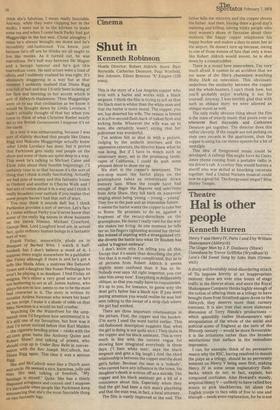Cinema
Shut in
Kenneth Robinson
Hustle Director: Robert Aldrich. Stars: Burt Reynolds. Catherine Deneuve, Paul Winfield, Ben Johnson, Eileen Brennan 'X' Empire (120 mins).
This is the story of a Los Angeles copper who lives with a harlot and works with a black sergeant. I think the film is trying to tell us that the black man is whiter than the white man and that the harlot is more moral. The copper, you see, has deserted his wife. The reason is hinted at in a five-second flash-back of naked flesh and kicking limbs. Whatever the wife was up to here, she certaintly wasn't saying that her policeman was wonderful.
I've seldom felt so shut in with a picture. Judging by the underlit interiors and the oppressive exteriors, the director knew what he was doing. But if I have to watch such an unsavoury story, set in the promising landscapes of California, I could do with some pleasant decor to sheer me up. _ We start in the copper's apartment. The non-stop music the harlot plays on the gramophone takes us relentlessly down memory lane. When the couple have had enough of Begin the Beguine and selections from Artie Shaw, they fall back on Aznavour singing about being 'young — young — young'. They live in the past and an impossible future. It seems the harlot wants the copper to take her to Rome. He promises to do so, against a fragment of the recucy-davecheze on the gramophone. He doesn't really care for the way she makes her living. At one moment he tells her so, his fingers tightening around her throat. But instead of expiring with a strangulated cry, she diverts the battle into what Dr Reuben has called 'a fragrant embrace'.
I don't know why I'm telling you all this. Except that it's easier than describing the plot. Not that it is really very complicated. But as in all pictures from Robert Aldrich it seems slightly more confused than it has to be. Nobody ever says 'All right inspector, you can take him away now'. Everything is deliberately oblique, so that you really have to concentrate. It's up to you, for instance, to guess why the dead girl's father has a black eye. If you were paying attention you would realise he was last seen talking to the owner of a strip club where the girl had worked.
There are three important relationships in the picture. First, the copper and the hooker. (I'm sorry I used the word harlot earlier. This old-fashioned description suggests that what the girl is doing is not quite nice.) Then there is the copper and his black assistant. This is very much in line with the current vogue for showing how integrated everybody is these days. CI hate white men', says the black sergeant and gets a big laugh.) And the third relationship is between the copper and the dead girl's father. Because the man is a 'nobody', who cannot have any influence in the town, his daughter's death is written off as a suicide. The copper and his black assistant get a bit of a conscience about this. Especially when they find the girl had been a rich man's plaything and that the man was, in fact, a local attorney.
The film is vastly improved at the end. The father kills the attorney and the copper shoots the father. And then, having done a good day's maiming and killing, among kinky people who steal women's shoes or fantasise about their mothers, the happy copper telephones his happy hooker and makes a date to meet her at the airport. He doesn't turn up because, owing to one of those ironies of fate that only a man like Robert Aldrich would invent, he is shot down by a casual robber.
There is a moral here somewhere, I'm very much afraid. It cannot be an accident that we see some of the film's characters watching Moby Dick on television. This obviously underlines the similarity between the copper and the whale-hunters. I can't think how, but you'll probably enjoy working it out for yourself. Anyway, I was terribly glad that with such an oblique story we were allowed an oblique moral as well.
The only really obvious thing about the film is the mass of treacly music that pours over us whenever Burt Reynolds and Catherine Deneuve get together. The director does this rather cleverly. If the couple are not putting on their own records in the apartment, then the copper is using his car stereo-system for a bit of nostalgia.
This idea of foreground music could be developed. A railway film might have its Casey Jones theme coming from a portable radio in the driver's cab. A cowboy film would feature a sheriff who was skilled at knocking coconuts together. And a United Nations musical could now be a great hit. The foreground singer? Miss Shirley Temple.
•


























 Previous page
Previous page